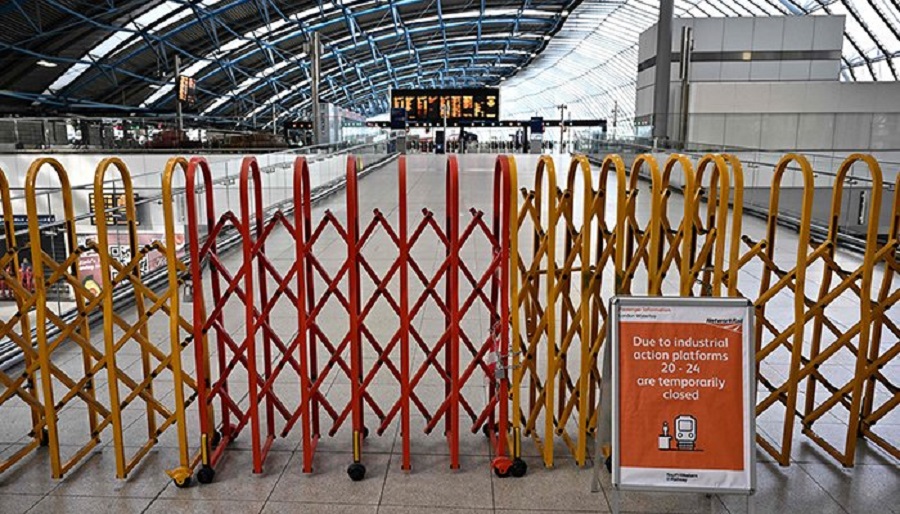
The Waterloo Station remains closed in London on June 21, 2022 as the biggest rail strike in over 30 years hits the UK. Rush-hour commuters in the UK faced chaos as railway workers began the network´s biggest strike action in more than three decades, with a cost-of-living crisis threatening wider industrial action. — AFP
Travel across British railway stations ground to a halt Tuesday as widespread strike action billed as the biggest in more than three decades plunged commuters into chaos and persuaded many to stay at home.
The RMT rail union argues the strikes are necessary as wages have failed to keep pace with UK inflation, which has hit a 40-year high and is on course to keep rising.
Last-ditch talks to avert the work stoppage broke down Monday, prompting more than 50,000 RMT members to walk out.
But negotiations will resume Wednesday, the RMT announced. Network Rail, which looks after the country’s rail tracks, told AFP discussions would begin at 10:00 am (0900 GMT).
Railway and London Underground stations, normally a sea of people for the morning and evening rush hours, were deserted or even locked, with just a skeleton service running on many networks across the country.
Passengers were warned not to travel all week, with two more days of strike action scheduled for Thursday and Saturday playing havoc with schedules.
Cab firms reported a surge in demand, while the main roads were packed with buses and cars, with cyclists weaving in between.
Long queues formed at bus stops on the outskirts of London shortly after 6:00 am (0500 GMT), but many gave up as services carried on without stopping, already full.
Commuters trying to make their way home faced similar struggles.
‘Frustrating’
Amber Zito, 24, a canine hydrotherapist from Holmfirth, West Yorkshire, called the strikes "frustrating" after missing her morning train, but supported the rail workers.
"Everything is kind of going tits up at the moment — planes, trains, everything.
"I blame the government. I don’t blame the people who work for train companies at all, they are only trying to do what everyone wants for their job."
The country appeared divided over the strikes, with 37 percent in favour this week compared with 45 percent against, according to a snap YouGov survey.
The government maintains the issue must be resolved by the private train operators and the unions.
Transport Secretary Grant Shapps said he "deplored" the strikes, which he said evoked the "bad old days of the 1970s" when industrial action was far more common.
"The people that are hurting are people who physically need to turn up for work, maybe on lower pay, perhaps the cleaners in hospitals," he told Sky News.
‘Stay the course’
Prime Minister Boris Johnson, addressing his cabinet, urged "the union barons to sit down with Network Rail and the train companies" to thrash out a deal.
The country needed to "stay the course", defending reforms to the rail network as needed and in the public interest.
RMT general-secretary Mick Lynch has described as "unacceptable" offers of below-inflation pay rises by both overground train operators and London Underground, which runs the Tube in the capital.
The walkouts risk causing significant disruption to major events including the Glastonbury music festival.
Thousands of teenagers taking national school exams were also hit. Some decided to leave at least an hour earlier to make it in time, while others took taxis.
The strikes are the biggest dispute on Britain’s railway network since 1989, according to the RMT. And rail operators warn of disruption throughout the week.
Only about 20 percent of services are running during the walkouts and half of all lines are closed. Those lines that are still open are running at reduced capacity.
And as well as the above-ground rail strike, RMT members on the London Underground are staging a 24-hour Tube train stoppage Tuesday.
Service is expected to reach 60 percent Wednesday, threatening further disruption.
Teachers, lawyers, NHS
Countries around the world are being hit by decades-high inflation as the Ukraine war and the easing of Covid restrictions fuel energy and food price hikes.
Unions also warn railway jobs are at risk, with passenger traffic yet to fully recover after the lifting of coronavirus pandemic lockdowns.
The strikes are compounding wider travel chaos after airlines were forced to cut flights owing to staff shortages, causing long delays and frustration for passengers.
Thousands of workers were sacked in the aviation industry during the pandemic, and the sector is struggling to recruit workers back as travel demand rebounds following the lifting of lockdowns.
The Criminal Bar Association, representing senior lawyers in England and Wales, have voted to strike from next week in a row over legal aid funding.
Teaching staff, workers in the state-run National Health Service and the postal service are also mulling strike action.













